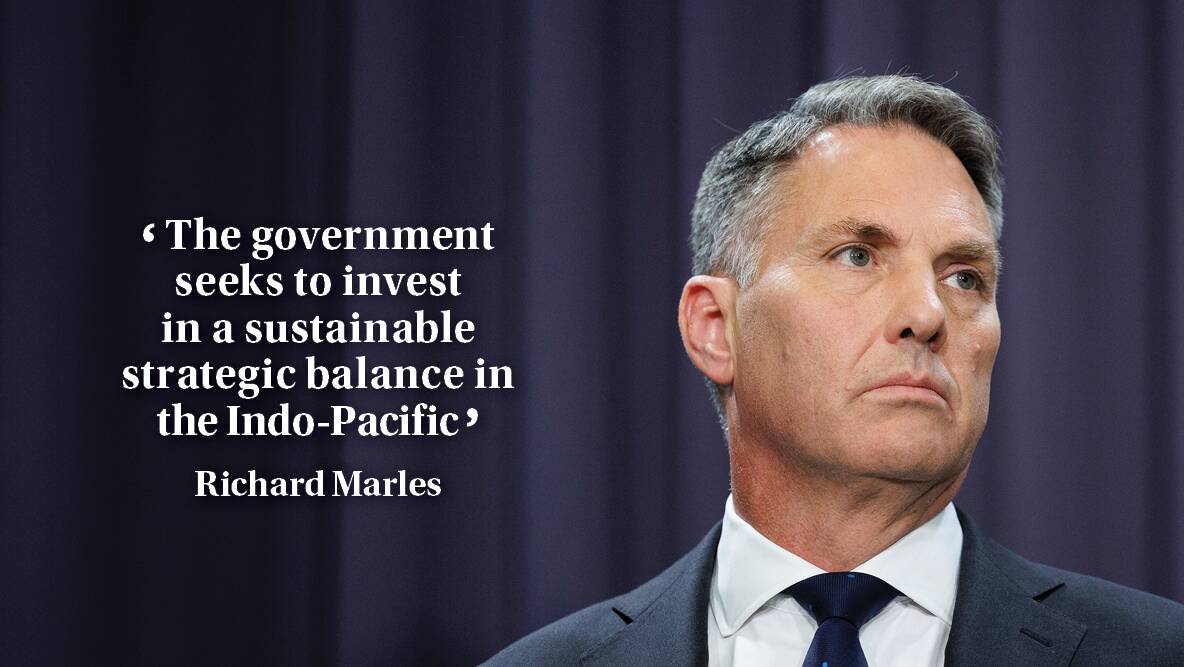Richard Marles has announced a "complete rebuild" of Defence's planned procurement, including the re-prioritisation of $72.8 billion over the decade.
The Defence Minister unveiled the updated investment program as he announced Australia's first defence strategy on Wednesday, April 17.
Federal funding for Defence is now expected to reach more than $50 billion over the next decade.
Mr Marles, who is also the Deputy Prime Minister, also announced that an additional $1 billion would go towards the procurement of long-range missiles over the next four years.
The Integrated Investment Plan, which sets out a 10-year procurement pathway for Defence, has been allocated $330 billion in total.
The AUKUS deal will be a centrepiece of the plan, with $53 to $63 billion to go towards acquiring nuclear-powered submarine capability over the next 10 years.
Between $51 and $69 billion will be directed to the Navy's surface combatant fleet, and continuous shipbuilding, over the decade.
Over the next decade, $28 to 35 billion will be directed towards longer-range strike and targeting, after it was listed as one of the key focuses of the Defence Strategic Review.

"Not all of these investments will be headline-grabbing," Mr Marles told journalists in Canberra on Wednesday.
"But they are also the kinds of necessary investments that cannot be delivered quickly when you need them most."
The update required the re-prioritisation of $22.5 billion over the next four years and $72.8 billion over the decade.
Strategy delivered in midst of 'uncertainty and tensions'
The strategy is set against the backdrop of "uncertainty and tensions of entrenched and increasing strategic competition between the United States and China", Mr Marles said, as well as large-scale war on the European continent and conflict in the Middle East.
"Australia no longer has the luxury of a ten-year window of strategic warning time for conflict," he said.
"The National Defence Strategy observes that the combined effect of this has seen our strategic environment deteriorate over the last twelve months."
The latest strategy is focused on preparing Australia to deter a potential adversary from projecting force against the country, including "the capability to hold the military assets of an adversary at risk at greater distance from our shores".
It also aims to ensure Australia can work with partners to "help deter broader conflict in our region that would be disastrous for us all".
"In this way, the government seeks to invest in a sustainable strategic balance in the Indo-Pacific," Mr Marles said.
"A balance where no state is militarily predominant, and in which no state judges that the benefit of conflict might outweigh the risks."
Strategy published after Defence Strategic Review
The first of its kind, the strategy was drawn up in response to a recommendation in the Defence Strategic Review.
It will be updated biennially, and is intended to lay out a detailed overview of Defence policy, planning, capabilities and resourcing.
The Defence Strategic Review, released in April 2023, found Australia's defence force was "not fully fit for purpose" and made dozens of recommendations, which targeted shifting focus to longer-range strike missiles and increasing presence in the northern bases.
Other key areas for action included the AUKUS submarine deal, improving workforce retention, deepening diplomatic and defence partnerships and growing capacity to turn new technology into defence force capability.
In response to the review, the government re-prioritised an initial $7.8 billion in programs to 2027, causing changes to 21 projects, delays to six and cancellations to a further six.
'Bureaucratic language' criticised
Responding to the announcements, opposition spokesperson for Defence, Andrew Hastie, criticised the Defence Minister for failing to "clearly articulate the challenges facing Australia".
"The Minister reverted to vague, bureaucratic language in talking about Australia's national security and Defence spending, and we are still no clearer on what 'impactful projection' is, or how it will work for the Australian Defence Force," Mr Hastie said.
Mr Hastie claimed that a Coalition government would provide greater "clarity around threats to Australia, our strategy to defeat them, and defence funding [would] be higher than the Albanese Government".
Greens spokesperson for Defence, David Shoebridge, was also critical of the announcements, saying "the giant AUKUS-sized-elephant in the room ... has eaten up Defence's budget and imposed the extra cost of less stability and the peace in the region".


